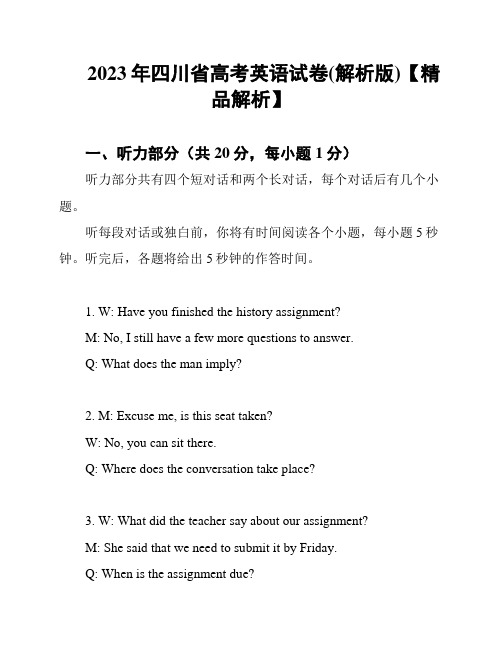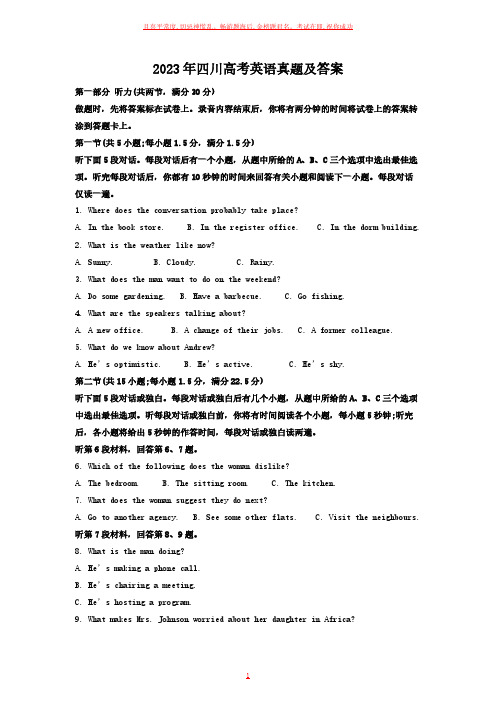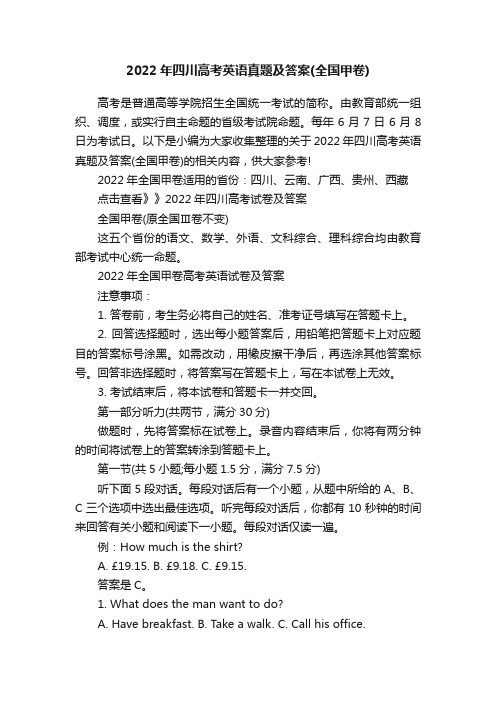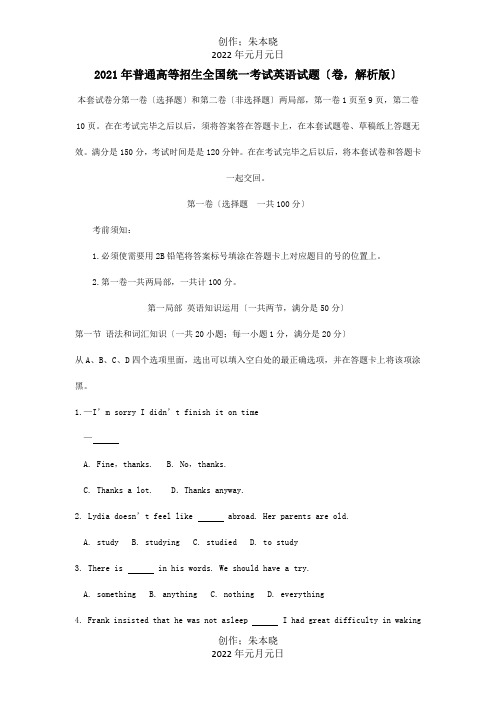.全国高考英语试卷及答案-四川卷
2023年四川省高考英语真题(解析版)

2023年四川省高考英语真题(解析版)第一部分听力(共两节,满分30分)做题时,先将答案标在试卷上。
录音内容结束后,你将有两分钟的时间将试卷上的答案转涂到答题卡上。
第一节(共5小题;每小题1.5分,满分1.5分)听下面5段对话。
每段对话后有一个小题,从题中所给的A、B、C三个选项中选出最佳选项。
听完每段对话后,你都有10秒钟的时间来回答有关小题和阅读下一小题。
每段对话仅读一遍。
1.Where does the conversation probably take place?A.In the book store.B.In the register office.C.In the dorm building.2.What is the weather like now?A.Sunny.B.Cloudy.C.Rainy.3.What does the man want to do on the weekend?A.Do some gardening.B.Have a barbecue.C.Go fishing.4.What are the speakers talking about?A.A new office.B.A change of their jobs.C.A former colleague.5.What do we know about Andrew?A.He’s optimistic.B.He’s active.C.He’s shy.第二节(共15小题;每小题1.5分,满分22.5分)听下面5段对话或独白。
每段对话或独白后有几个小题,从题中所给的A、B、C三个选项中选出最佳选项。
听每段对话或独白前,你将有时间阅读各个小题,每小题5秒钟;听完后,各小题将给出5秒钟的作答时间,每段对话或独白读两遍。
听第6段材料,回答第6、7题。
6.Which of the following does the woman dislike?A.The bedroom.B.The sitting room.C.The kitchen.7.What does the woman suggest they do next?A.Go to another agency.B.See some other flats.C.Visit the neighbours.听第7段材料,回答第8、9题。
2023年四川省高考英语试卷(解析版)【精品解析】

2023年四川省高考英语试卷(解析版)【精品解析】一、听力部分(共20分,每小题1分)听力部分共有四个短对话和两个长对话,每个对话后有几个小题。
听每段对话或独白前,你将有时间阅读各个小题,每小题5秒钟。
听完后,各题将给出5秒钟的作答时间。
1. W: Have you finished the history assignment?M: No, I still have a few more questions to answer.Q: What does the man imply?2. M: Excuse me, is this seat taken?W: No, you can sit there.Q: Where does the conversation take place?3. W: What did the teacher say about our assignment?M: She said that we need to submit it by Friday.Q: When is the assignment due?M: I'm afraid I have some other plans already.Q: What does the man mean?5. M: Could I borrow your pen? I forgot to bring mine.W: Sure, here you go.Q: What does the woman do?6. W: Could you give me a hand with this heavy box?M: Of course, I'll help you.Q: What will the man do?7. W: I'm thinking of going hiking this weekend. Would you like to join me?M: Sounds great! I've always wanted to go hiking.Q: What do we learn about the man?8. M: Did you watch the football match last night?W: Yes, it was so exciting. Our team won 3-1.Q: What happened in the football match?9. W: How do you usually spend your weekends?M: I usually go shopping or watch movies with my friends.Q: What does the man like to do on weekends?10. M: Is Susan still studying in London?W: No, she moved back to China last month.Q: Where is Susan now?二、阅读理解(共40分,每小题2分)阅读下列短文,从每篇短文后所给各题的四个选项(A、B、C 和D)中,选出最佳选项。
历年四川英语高考试题及答案

历年四川英语高考试题及答案历年四川英语高考试题第I卷第一部分听力(共两节,满分30分)做题时,现将答案标在试卷上,录音内容结束后,你将有两分钟的时间将试卷上的答案转涂到答题卡上。
第一节(共5小题;每小题1.5分,满分7.5分)听下面5段对话,每段对话后有一个小题。
从题中所给的A、B、C三个选项中选出最佳选项,并标在试卷的相应位置。
听完每段对话后,你都有10秒钟的时间来回答有关小题和阅读下一小题。
每段对话仅读一遍。
1. Why does the woman look pale?A. She is ill.B. She hasnt slept well.C. She is repairing a road.2. What is the most difficult thing for the man to remember?A. Names.B. Events.C. Dates.3. What does the mans sister want to be?A. A dance.B. An English teacher.C. A dance teacher.4. What does the woman think of TV advertising?A. It is very attractive.B. It is very expensive.C. It can impress the audience.5. What does the man want to do?A. Borrow some books.B. Get a library card.C. Get a student card.第二节(共15小题;每小题1.5分,满分22.5分)听下面对话或独白。
每段对话或独白后有几个小题,从题中所给的A、B、C 三个选项中选出最佳选项,并标在试卷的相应位置。
听每段对话或独白前,你将有时间阅读各个小题,每小题5秒钟;听完后,各小题将给出5秒钟的作答时间。
2023年四川高考英语真题及答案

2023年四川高考英语真题及答案第一部分听力(共两节,满分30分)做题时,先将答案标在试卷上。
录音内容结束后,你将有两分钟的时间将试卷上的答案转涂到答题卡上。
第一节(共5小题;每小题1.5分,满分1.5分)听下面5段对话。
每段对话后有一个小题,从题中所给的A、B、C三个选项中选出最佳选项。
听完每段对话后,你都有10秒钟的时间来回答有关小题和阅读下一小题。
每段对话仅读一遍。
1. Where does the conversation probably take place?A. In the book store.B. In the register office.C. In the dorm building.2. What is the weather like now?A. Sunny.B. Cloudy.C. Rainy.3. What does the man want to do on the weekend?A. Do some gardening.B. Have a barbecue.C. Go fishing.4. What are the speakers talking about?A. A new office.B. A change of their jobs.C. A former colleague.5. What do we know about Andrew?A. He’s optimistic.B. He’s active.C. He’s shy.第二节(共15小题;每小题1.5分,满分22.5分)听下面5段对话或独白。
每段对话或独白后有几个小题,从题中所给的A、B、C三个选项中选出最佳选项。
听每段对话或独白前,你将有时间阅读各个小题,每小题5秒钟;听完后,各小题将给出5秒钟的作答时间,每段对话或独白读两遍。
听第6段材料,回答第6、7题。
6. Which of the following does the woman dislike?A. The bedroom.B. The sitting room.C. The kitchen.7. What does the woman suggest they do next?A. Go to another agency.B. See some other flats.C. Visit the neighbours. 听第7段材料,回答第8、9题。
2022年四川高考英语真题及答案(全国甲卷)

2022年四川高考英语真题及答案(全国甲卷)高考是普通高等学院招生全国统一考试的简称。
由教育部统一组织、调度,或实行自主命题的省级考试院命题。
每年6月7日6月8日为考试日。
以下是小编为大家收集整理的关于2022年四川高考英语真题及答案(全国甲卷)的相关内容,供大家参考!2022年全国甲卷适用的省份:四川、云南、广西、贵州、西藏点击查看》》2022年四川高考试卷及答案全国甲卷(原全国Ⅲ卷不变)这五个省份的语文、数学、外语、文科综合、理科综合均由教育部考试中心统一命题。
2022年全国甲卷高考英语试卷及答案注意事项:1. 答卷前,考生务必将自己的姓名、准考证号填写在答题卡上。
2. 回答选择题时,选出每小题答案后,用铅笔把答题卡上对应题目的答案标号涂黑。
如需改动,用橡皮擦干净后,再选涂其他答案标号。
回答非选择题时,将答案写在答题卡上,写在本试卷上无效。
3. 考试结束后,将本试卷和答题卡一并交回。
第一部分听力(共两节,满分30分)做题时,先将答案标在试卷上。
录音内容结束后,你将有两分钟的时间将试卷上的答案转涂到答题卡上。
第一节(共5小题;每小题1.5分,满分7.5分)听下面5段对话。
每段对话后有一个小题,从题中所给的A、B、C三个选项中选出最佳选项。
听完每段对话后,你都有10秒钟的时间来回答有关小题和阅读下一小题。
每段对话仅读一遍。
例:How much is the shirt?A. £19.15.B. £9.18.C. £9.15.答案是C。
1. What does the man want to do?A. Have breakfast.B. Take a walk.C. Call his office.2. What was George doing last night?A. Having a meeting.B. Flying home.C. Working on a project.3. Why does the man suggest going to the park?A. It's big.B. It's quiet.C. It's new.4. How does the woman sound?A. Annoyed.B. Pleased.C. Puzzled.5. Where is the man's table?A. Near the door.B. By the window.C. In the corner.第二节(共15小题;每小题1.5分,满分22.5分)听下面5段对话或独白。
四川高考英语试题及答案

四川高考英语试题及答案一、听力理解1. What does the woman mean?A) She doesn't like the movie.B) She thinks the movie is too long.C) She enjoyed the movie.D) She thinks the movie is too short.答案:C2. When does the conversation most likely take place?A) In the morning.B) In the afternoon.C) In the evening.D) At night.答案:B二、阅读理解Passage 13. What is the main idea of the passage?A) The importance of water conservation.B) The effects of climate change on agriculture.C) The impact of drought on wildlife.D) The need for sustainable farming practices.答案:A4. According to the passage, what can be done to reduce water waste?A) Installing water-saving devices.B) Using more fertilizers.C) Planting more trees.D) Building more dams.答案:APassage 25. What is the author's opinion about the new policy?A) It is too restrictive.B) It is necessary for the environment.C) It is not effective enough.D) It is too lenient.答案:B6. What is the purpose of the policy?A) To reduce traffic congestion.B) To promote public transportation.C) To encourage carpooling.D) To improve air quality.答案:D三、完形填空7. The word "abundant" in the sentence means ______.A) scarceB) sufficientC) excessiveD) insufficient答案:B8. The author uses the example of the ______ to illustrate the importance of ______.A) farmer; technologyB) scientist; educationC) doctor; healthD) artist; creativity答案:A四、语法填空9. If it were not for the support from the community, we______ our goals so quickly.A) wouldn't achieveB) didn't achieveC) wouldn't have achievedD) hadn't achieved答案:C10. The research team ______ the project last year and it is now in its final stage.A) had startedB) has startedC) startedD) was starting答案:C五、短文改错11. Last summer, my family and I went to a small village for our vacation. We stayed in a beautiful house, which was built of wood and surrounded by a lot of trees. Every morning, we would go for a walk in the woods, listening to the birds singing and enjoying the fresh air. One day, while we were walking, we came across a small river. The river was so clear that we could see the bottom clearly. We decided to swim in it, but my brother slipped and hurt his leg. Luckily, a local doctor was nearby and he helped us. We were very grateful for his kindness.Mistake: "a lot of trees"Correction: "lots of trees"Mistake: "The river was so clear that we could see the bottom clearly."Correction: "The river was so clear that we could see the bottom clearly."六、书面表达12. Write an essay of about 120 words on the topic "The Role of Technology in Education". You should write clearly and coherently, including an introduction, body, and conclusion.范文:Technology has become an integral part of education, enhancing the learning experience and providing new opportunities for students. In classrooms, interactive whiteboards and online resources have made lessons moreengaging and informative. Additionally, technology allows for personalized learning, catering to individual students' needs and paces. Online platforms enable students to access a wealth of knowledge beyond the classroom, fostering a culture of lifelong learning. However, it is crucial to balance technology use with traditional teaching methods to ensure a well-rounded education. In conclusion, technology plays a vital role in modern education by supplementing traditional teaching and offering innovative ways to learn.。
普通高等学校招生国统一考试英语试题四川卷,解析 试题

2021年普通高等招生全国统一考试英语试题〔卷,解析版〕本套试卷分第一卷〔选择题〕和第二卷〔非选择题〕两局部,第一卷1页至9页,第二卷10页。
在在考试完毕之后以后,须将答案答在答题卡上,在本套试题卷、草稿纸上答题无效。
满分是150分,考试时间是是120分钟。
在在考试完毕之后以后,将本套试卷和答题卡一起交回。
第一卷〔选择题一共100分〕考前须知:1.必须使需要用2B铅笔将答案标号填涂在答题卡上对应题目的号的位置上。
2.第一卷一共两局部,一共计100分。
第一局部英语知识运用〔一共两节,满分是50分〕第一节语法和词汇知识〔一共20小题;每一小题1分,满分是20分〕从A、B、C、D四个选项里面,选出可以填入空白处的最正确选项,并在答题卡上将该项涂黑。
1.—I’m sorry I didn’t finish it on time—A. Fine,thanks.B. No,thanks.C. Thanks a lot. D.Thanks anyway.2. Lydia doesn’t feel like abroad. Her parents are old.A. studyB. studyingC. studiedD. to study3. There is in his words. We should have a try.A. somethingB. anythingC. nothingD. everything4. Frank insisted that he was not asleep I had great difficulty in wakinghim up.A. whetherB. althoughC. forD. so5.—How could you be so rude as to walk in here in the middle of my class?—_____________A. Nothing muchB. Nothing seriousC. Never againD. Never mind6. As it reported, it is 100 years Qinghua University was founded.A. whenB. beforeC. afterD. since7. To get a better grade, you should the notes again before the test.A. go overB. get overC. turn overD. take over8. Nick, it’s good for you to read some books China before you start your trip there.A. inB. forC. ofD. on9. All visitors to this village with kindness.A. treatB. are treatedC. are treatingD. had been treated10. Our teachers always tell us to believe in we do and who we are if we wantto succeed.A. whyB. howC. whatD. which11. Simon made a big bamboo box the little sick bird till it could fly.A. keepB. keptC. keepingD. to keep12.—How was your recent trip to Sichuan?—I’ve never had one before.A. a pleasantB. a more pleasantC. a most pleasantD. the most pleasant13. Always remember put such dangerous things as knives out children’s .A. touchB. sightC. reachD. distance14. I often the words I don’t know in the dictionary or on the internet.A. look upB. look atC. kook forD. look into15. Was it on a lonely island he was saved one month after the boat went down?A. whereB. thatC. whichD. what16. an important role in a new movie, Andy has a chance to become famous.A. OfferB. OfferingC. OfferedD. To offer17. The school shop, customers are mainly students, is closed for theholidays.A. whichB. whoseC. whenD. where18. Dr. Peter Spence, headmaster of the school, told us, “ fifth ofpupils here go on to study at Oxford and Cambridge.〞A. 不填;AB. 不填;TheC. the;TheD. a; A19.—What a mistake!—Yes. I his doing it another way, but without success.A. was suggestingB. will suggestC. would suggestD. had suggested20. The police still have I found the lost child, but they’re doing all they .A. canB. mayC. mustD. should1. D 解析:此题考察情景交际。
2020年普通高等学校招生全国统一考试英语试题(四川卷,含答案)

2020;2020年普通高等学校招生全国统一考试英语试题(四川卷,含答案)本试卷分第Ⅰ卷(选择题)和第Ⅱ卷(非选择题)两部分,第Ⅰ卷1页至11页,第Ⅱ卷12页至14页。
满分150分,考试时间120分钟。
考试结束后,将本试卷和答题卡一并交回。
第Ⅰ卷(选择题,共100分)注意事项:1.答第Ⅰ卷前,考生务必将自己的姓名、准考证号、考试科目涂写在答题卡上。
2.1—65小题选出答案后,用2B铅笔把答题卡上对应题目的答案标号涂黑,如需改动,用橡皮擦干净后,再选涂其他答案标号,在试题卷上作答无效。
第一部分英语知识运用(共两节,满分50分)第一节语法和词汇知识(共20小题;每小题1分,满分20分)从A、B、C、D四个选项中,选出可以填入空白处的最佳选项,并在答题卡上将该项涂黑。
1. —Here’s your change.——A. Thank you.B. Don’t mention it.C. No problemD. With pleasure.2. In most countries, a university degree can give you flying start in life.A. the; aB. the; 不填C.不填; 不填D.不填; a3. — I take the book out?—I'm afraid not.A. WillB. MayC. MustD. Need4. A great number of students said they were forced topractise the piano.A. to questionB. to be questionedC. questionedD. questioning5. Tired, Jim was fast asleep with his back a big tree.A. inB. belowC. besideD. against6. Some people eat with their eyes. They prefer to order what nice.A. looksB. smellsC. feelsD. tastes7. On my desk is a photo that my father took of when I was a baby.A. himB. hisC. meD. mine8.Jenny was looking for a seat when,luckily,a man and left.A.took up B.got up C.shut up D.set up9.We laugh at jokes,but seldom about how they work.A.we think B.think weC.we do think D.do we think10.After graduating from college,I took some time off to go travelling,turned out to be a wise decision.A.that B.which C.when D.where11.In many people’s opinion,that company,though relatively small,is pleasant .A.to deal with B.dealing with C.to be dealt with D.dealt with12.The school was moved out of downtown as the number of students had grown too .A.small B.few C.1arge D.many13.一I’m sorry.That wasn’t of much help.一Oh,.As a matter of fact,it was most helpful.A.sure it was B.it doesn’t matterC.of course not D.thanks anyway14.How much one enjoys himself travelling depends largely on hegoes with,whether his friends or relatives.A.what B.who C.how D.why15.Such poets as Shakespeare widely read,of whoseworks,however,some difficult to understand.A.are;are B.is;is C.are;is D.is:are16.一When shall we restart our business?一Not until we our plan.A.will finish B.are finishingC.are to finish D.have finished17.The lawyer listened with full attention, to miss any point.A.not trying B.trying notC.to try not D.not to try18.You’ve failed to do what you to and I’m afraid theteacher will blame you.A.will expect B.will be expectedC.expected D.were expected19.If you have a job,yourself to it and finally you’ll succeed.A.do devote B.don't devoteC.devoting D.not devoting20.Because of the heavy traffic,it was already time for lunch break she got to her office.A.since B.that C.when D.until第二节完形填空(共20小题;每小题l 5分,满分30分)阅读下面短文,从短文后各题所给的四个选项(A、B、C和D)中,选出可以填入空白处的最佳选项,并在答题卡上将该项涂黑。
- 1、下载文档前请自行甄别文档内容的完整性,平台不提供额外的编辑、内容补充、找答案等附加服务。
- 2、"仅部分预览"的文档,不可在线预览部分如存在完整性等问题,可反馈申请退款(可完整预览的文档不适用该条件!)。
- 3、如文档侵犯您的权益,请联系客服反馈,我们会尽快为您处理(人工客服工作时间:9:00-18:30)。
普通高等学校招生全国统一考试(四川卷)英语本试卷分第一I卷(选择题)和第Ⅱ卷(非选择题)两部分。
第1卷1至13页,第Ⅱ卷14至17页。
满分150分,考试时间120分钟。
考试结束,将本试卷和答题卡一并交回。
第 I 卷注意事项:1.答第1卷前,考生务必将自己的姓名、准考证号、考试科目用铅笔涂写在答题卡上。
2.每小题选出答案后,用铅笔把答题卡上对应题目的答案标号涂黑。
如需改动,用橡皮擦干净后,再选涂其他答案标号。
不能答在试卷上。
第一部分听力(共两节。
满分30分)做题时,先将答集标在试卷上。
录音内容结束后,你将有两分钟的时间将试卷上的答案转涂到答题卡上。
第一节(共5小题;每小题1.5分,满分7.5分)听下面5段对话。
每段对话后有一个小题,从题中所给的A、B、c三个选项中选出最佳选项,并标在试卷的相应位置。
听完每段对话后,你都有10秒钟的时间来回答有关小题和阅读下一小题。
每段对话仅读一遍。
例:How much is the shirt?A.£19.15.B.£9.15.C.£9.18.答案是B。
1.Who is coming for tea?A.John.B.Mark.C.Tracy.2.What will the man do next?A.Leave fight away.B.Stay for dinner.C.Catch a train.3.What does the mall come for?A.A lecture.B.A meeting.C.A party.4.、What size does the man want?A.9.B.35.C.39.5.What are the speakers talking about?A.Life in Southeast Asia.B.Weather conditions.C.A holiday tour.第二节(共15小题;每小题1.5分,满分22.5分)听下面5段对话或独白。
每段对话或独自后有几个小题,从题中所给的A、B、C三个选项中选出最佳选项,并标在试卷的相应位置。
听每段对话或独白前,你将有时间阅读各个小题,每小题5秒钟;听完后,各小题将给出5秒钟的作答时间。
每段对话或独白读两遍。
听第6段材料,回答第6、7题。
6.What is the man doing?A.Giving a speech.B.Chairing a meeting.C.Introducing a person.7.Why does the woman sing so well?A.She has a great teacher.B.She teaches singing.C.She is young.听第7段材料,回答第8、9题。
8.What is the second gift for Jimmy?A.A car. B.A watch.C.A computer.9.Why does Jimmy feel happy?A.He lives with his parents.B.He’s got what he dreamt of.C.He’s received lots of presents.听第8段材料,回答第10至12题。
10.What is the relationship between the speakers?A.They are friends.B.They are strangers to each other.C.They are husband and wife.11.Why does the woman come to talk with the man?A.To get a job.B.To take a test.C.To see the secretary.12.What does the man mean by saying sorry?A.He can’t hear the woman clearly.B.He doesn't need a designer.C.He can’t help the woman.听第9段材料,回答第13至16题。
13.What do we know about the woman?A.She lives close to the office.B.She is new to the company.C.She likes the big kitchen.14.How does the man go to work?A.On foot.B.By bus.C.By car.15.Why was Susan late for work?A.She missed the bus.B.Her train was late.C.Her car broke down.16.What will the man do the next day?A.Go to work by train.B.Visit Lily in her flat.C.Leave home earlier.听第10段材料,回答第17至20题。
17.Where can you most probably hear this talk?A.In a class of the English language.B.In a class of the Greek language.C.In a class of the French language.18.How long does the class last?A.11 weeks.B.13 weeks.C.15 weeks.19.What is“the short-cut”to learning words according to the speaker?A.Taking more courses.B.Reading basic words aloud.C.Learning how words are formed.20.Why is the class popular?A.It is not offered each term.B.It’s taught by Professor Morris.C.It helps to master some useful rules.第二部分英语知识运用(共两节,满分45分)第一节单项填空(共15小题;每小题1分,满分15分)从A、B、c、D四个选项中,选出可以填人空白处的最佳选项,并在答题卡上将该项涂黑。
例:It is generally considered unwise to give a child ________ he or she wants.A.however B.whatever C.whichever D.whenever答案是B。
21.—Thank you for joining in our conversation tonight.—_______ .A.It’s my duty B. It’s all right C.It’s my pleasure D.It’s nice to say so22.How about taking ______ short break? I want to make _______ call.A..the;a B.a;the C.the;the D.a;a 23.When you get the paper back, pay special attention to what ________ .A.have marked B. have been marked C.had marked D.had been marked24.一What does the sign over there read?一“No person ________ smoke or carry a lighted cigarette,cigar or pipe in this area.”A.will B.may C.shall D. must 25.Some students often listen to music ________ classes to refresh themselves.A.between B.among C.over D.during 26.Peter received a letter just now ________ his grandma would come to see him soon.A.said B.says C.saying D.to say27.It is reported that two schools,________ are being built in my hometown,will open next year.A.they both B.which both C.both of them D.both of which 28.Mum ________ to us,“Be quiet! Your little sister’s sleeping.”A.whispered B.shouted C.explained D.replied29. I'd like to study law at university ________ my cousin prefers geography.A. thoughB. asC. whileD. for30. —Did you see a man in black pass by just now?—No, sir. I ________ a newspaper.A. readB. was readingC. would readD. am reading31. Of the two coats, I'd choose the ________ one to spare some money for a book.A. cheapestB. cheaperC. more expensiveD. most expensive32. Little joy can equal ________ of a surprising ending when you read stories.A. thatB. thoseC. anyD. some33. It was so dark in the cinema that I could hardly my friend.A. turn outB. bring outC. call outD. pick out34. —Dad! Tom's broken a glass!—________. Accidents will happen.A. No wayB. Doesn't matterC. No trouble at allD. Don't mention it35. The flowers his friend gave him will die unless ________ every day.A. wateredB. watering B. water D. to water第二节完形填空(共20小题;每小题1.5分,满分30分)阅读下面短文,掌握其大意,然后从36—55各题所给的四个选项(A、B、C和D)中选出最佳选项,并在答题卡上将该项涂黑。
